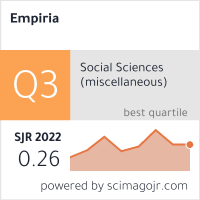Using Social Network Analysis to study the Modularity of Protest Forms: The evolution of the Basque Repertoire of Contention (1980- 2014)
DOI:
https://doi.org/10.5944/empiria.52.2021.31365Keywords:
repertoire of contention, modularity, social network analysis, protest event analysis, Basque Country, repertorio de contienda, modularidad, análisis de redes sociales, análisis de eventos de protesta, Euskal HerriaAbstract
Demonstrations, strikes, direct actions, and acts of civil disobedience are just a few examples of the broad set of protest tactics potentially available to citizens in order to raise their demands and call the public’s attention to unjust situations. Each of these forms of claim-making can be more or less modular. Modularity, a concept originally introduced by Sidney Tarrow (1993) and popularized by Charles Tilly (1993, 1995), refers to the adaptability or degree of transferability of protest forms to different circumstances of contention. A protest form is strongly modular when it belongs to the regular repertoire of diverse actors and is employed for the defense of varied issues, against distinct targets, and in different places. Nonetheless, despite the considerable popularity of the concept for theoretical elaboration, its empirical operationalization has so far remained underdeveloped. In this article, building upon the conceptual bases set up by Wada (2012), we lay out a new perspective for the evaluation of the modularity of protest forms. Drawing upon social network analysis, we propose to analyze contingency tables generated from protest event catalogs as two-mode networks, measuring tactical transferability as weighted degree centrality (Opsahl et al. 2010). To demonstrate the usefulness of our proposed operationalization, we examine a large original dataset of protest events, applying our measure in order to evaluate repertoire change in the Basque Country over the last four decades, tracing the evolution of ten different protest forms in terms of actor transferability. Results show a relatively rigid repertoire in which demonstrations appear as dominant, at the same time that symbolic protests have gradually increased its modularity in recent years, at the expense of civil disobedience and violent direct action, which used to be significantly more relevant during the 80s and 90s. In comparison with Wada’s original proposal, the new measure of modularity proposed in this article derives from a more intuitive operationalization and offers an easily interpretable visual representation of the data. These advantages could eventually encourage more empirical research comparing the varying modularity of forms of contention across diverse contexts and periods.
Downloads
Downloads
Published
How to Cite
Issue
Section
License
Copyright (c) 2021 Empiria. Revista de metodología de ciencias sociales

This work is licensed under a Creative Commons Attribution-NonCommercial-ShareAlike 4.0 International License.
Los autores que publican en esta revista están de acuerdo con los siguientes términos:a) Los autores conservan los derechos de autor y garantizan a la revista el derecho de ser la primera publicación del trabajo al igual que licenciado bajo una Licencia Internacional Creative Commons CC BY-NC-SA 4.0.
b) Se permite y se anima a los autores a difundir electrónicamente las versiones pre-print (versión antes de ser evaluada) y/o post-print (versión evaluada y aceptada para su publicación) de sus obras antes de su publicación, ya que favorece su circulación y difusión más temprana y con ello un posible aumento en su citación y alcance entre la comunidad académica.










